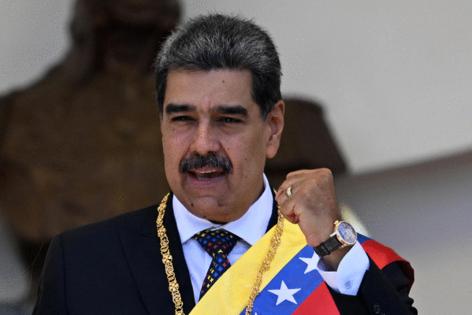Vanished: Amnesty International accuses Maduro of using disappearances as a weapon
Published in News & Features
They came without warning — often at night, without warrants or explanations. One moment, a journalist was driving home. A student stood at a border checkpoint. A lawyer met with union leaders. The next, they were gone — vanished without a trace.
Since Venezuela’s disputed 2024 presidential election, dozens of people have disappeared following encounters with security forces. According to a new report by Amnesty International, these are not isolated cases, but part of a coordinated campaign of “enforced disappearances” — a chilling tool of state repression that the organization warns may constitute crimes against humanity.
It is a deliberate strategy to silence dissent and terrorize the population, Amnesty said in its 46-page report, “The Crime of Enforced Disappearance in Venezuela: Detentions Without a Trace.” Covering 15 emblematic cases between July 2024 and June 2025, the report documents a pattern of arbitrary detentions, clandestine transfers and incommunicado detentions — often with victims never resurfacing.
Many of those targeted were journalists, human rights defenders, opposition members, and foreign nationals. Among the cases:
—Rory Branker, editor at La Patilla, was abducted in Caracas by armed men in February. He hasn’t been seen since. Officials later accused him of “extortion” but refused to disclose his whereabouts.
—Eduardo Torres, a lawyer with the group Venezuela Program Education-Action on Human Rights, known as PROVEA, disappeared in December. His name surfaced in terrorism court records, but his family has received no formal notice.
—Yevhenii Trush, a 19-year-old Ukrainian refugee with autism, was arrested at the Colombian border. He was fleeing war, but Venezuelan officials never acknowledged detaining him.
—Andrés Martínez and José María Basoa, two Spanish nationals, were arrested upon arrival from Madrid and labeled “CIA mercenaries.” Spain denies any link to the CIA.
Victims are frequently seized by agents from Venezuela’s military counterintelligence agency, DGCIM, or the Bolivarian intelligence service, SEBIN, often in unmarked cars and plainclothes operations. Detainees are shuffled between undisclosed facilities, their families left in the dark — violating international due process standards and raising grave concerns about torture and abuse.
The timing of the revelations is especially jarring in South Florida, where thousands of Venezuelans face imminent deportation as the Biden and Trump administrations ramp up repatriation flights.
Despite mounting evidence of systemic abuse, U.S. officials have begun declaring parts of Venezuela “safe” for return — a position sharply contested by human-rights advocates.
Operation ‘Tun Tun’
The crackdown intensified after President Nicolás Maduro declared himself the winner of a third term in a widely contested election on July 28, 2024. Within a week of the vote, more than 2,500 people were arrested during protests, and at least 25 demonstrators — including two minors — were killed by security forces.
The government dubbed its repressive response Operación Tun Tun, a slang term referring to predawn police raids. As part of the effort, authorities deployed a modified version of the “VenApp” mobile application — originally designed for reporting potholes and power outages — to allow regime loyalists to report protesters and critics. Passports were revoked, homes raided and civil society dismantled.
In a speech following the unrest, Maduro vowed “no forgiveness,” chillingly referencing Tocorón, one of the country’s most infamous prisons, as the fate awaiting demonstrators.
Diplomatic bargaining chips
Amnesty’s report raises alarms that foreign nationals may be detained not only for propaganda purposes but as potential leverage in backchannel diplomacy.
In January 2025, shortly after a U.S. envoy visited Caracas, the Maduro government quietly released several arbitrarily detained Americans — fueling speculation that detainees are being used as pawns in international negotiations.
A similar deal occurred in 2023, when Venezuela freed 10 political prisoners after a close Maduro ally — detained on money laundering charges in the U.S. — was returned to Caracas.
Under international law, enforced disappearance becomes a crime against humanity when carried out as part of a widespread or systematic attack on civilians. Amnesty argues Venezuela has met that threshold.
The country signed but never ratified the U.N. Convention on Enforced Disappearance. However, as a member of the Inter-American human rights system, it is still legally obligated to prevent and punish such acts.
Instead, the Maduro regime has “weaponized the justice system,” different human rights organizations warn, to enable disappearances and dismantle opposition.
Systematic torture
Amnesty’s findings align with a separate 110-page report released in May by the pro-democracry CASLA Institute, which documented the state’s widespread use of torture, psychological warfare, and enforced disappearances following the contested election.
CASLA’s report describes a terrifying resurgence of clandestine “torture houses” where detainees suffer electric shocks, suffocation, mock executions and sexual violence. Women face psychological torment and threats to their children. Visits, when allowed, are rare and heavily surveilled — and even words like “freedom” and “pain” are banned.
In Tocuyito prison, a method of punishment known as the “grilled arepa” is used: inmates are handcuffed and forced to lie on sun-scorched concrete. Those who resist are tortured with electric shocks, especially targeting their genitals.
Prisoners with chronic illnesses like HIV or diabetes receive no treatment. Food is scarce, sanitation is abysmal, and suicide attempts are frequent. CASLA concludes that these abuses are not rogue acts but part of state policy — “a calculated strategy to break the spirit, destroy resistance, and erase hope.”
_______
©2025 Miami Herald. Visit miamiherald.com. Distributed by Tribune Content Agency, LLC.







Comments